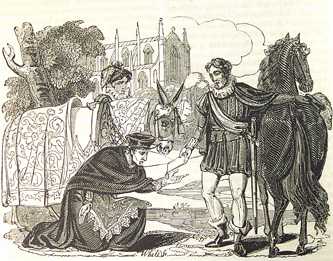The fall of Wolsey
Wolsey lost his favoured position mainly because he was unable to arrange Henry's divorce from Catherine of Aragon; since Wolsey's authority was derived from the Pope he would not risk making a decision without papal approval. Enemies of Wolsey in the Council easily persuaded the king to move towards a break with Rome. Wolsey was charged with violating the Statute of Praemunire* and most of his properties were confiscated by the crown. Sir Thomas More replaced him as Chancellor, while Cranmer and Cromwell rose to power in the King's Council by succeeding where Wolsey had failed: they developed a plan for royal supremacy over the Church and annulled Henry's marriage.
Henry did not abandon his former favourite entirely: he allowed Wolsey to keep some of his estates and restored to him the Archbishopric of York. Wolsey continued to live in lavish style and only his continued attempts to exert influence in politics led to his arraignment for treason in late 1530. But he died* on his way to London for trial, and was buried near Richard III, a site later known as "tyrants' grave."
Footnotes
-
Praemunire
The Statute of Praemunire, revised under Richard II in 1393, made it a punishable offence to defer English legal or property matters to a foreign court; Wolsey's position as papal legate was thus technically illegal. In 1531, after Wolsey's death, Henry brought charges against the entire English Church for acknowledging Wolsey's legatine authority, only granting pardons in return for money and recognition of the King as supreme head of the Church.
-
Wolsey's death
This is the state of man: today he puts forth
The tender leaves of hopes; tomorrow blossoms,
And bears his blushing honors thick upon him.
The third day comes a frost, a killing frost,
And, when he thinks, good easy man, full surely
His greatness is aripening, nips his root,
And then he falls. . . .
O, how wretched
Is that poor man that hangs on princes' favors!
(Henry VIII 3.2.353-59,367-68)
